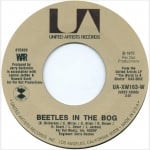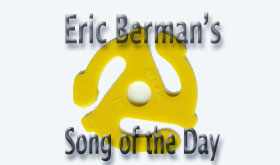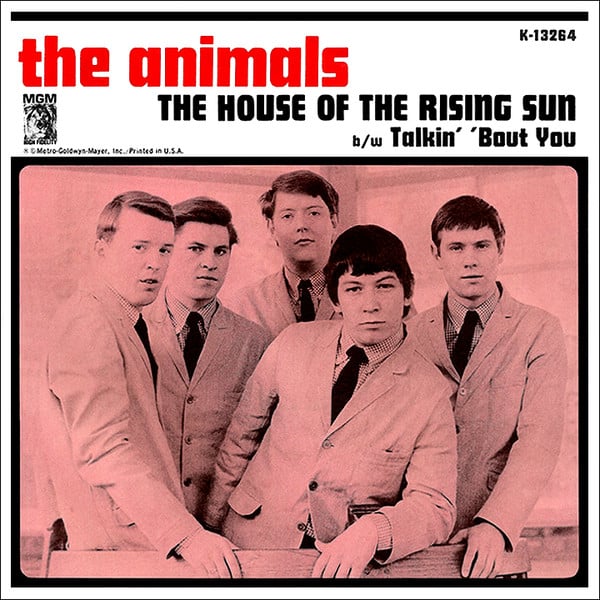The Jukebox Series #92 – WAR: “The Cicso Kid” b/w “Beetles In The Bog”– United Artist UA-XW163-W
Welcome back my friends, to the series that never ends…
When they first began recording, it was Eric Burdon and WAR and WAR was billed as the backing band for Eric Burdon of The Animals. The group was the brainchild of Burdon and Jerry Goldstein who was a member of The Strangeloves and the co-writer of a whole host of classic singles like “I Want Candy,” “My Boyfriend’s Back,” “Come On Down To My Boat,” “Sorrow” and “Hang On Sloopy.”
Goldstein was Sly & The Family Stone’s manager when he saw WAR performing in a bar and signed them to his own Far Out Production company. With Burdon at the helm, WAR scored the smash hit “Spill The Wine” from their 1970 debut album Eric Burdon Declares War. Another album followed, before Burdon went his own way leaving WAR to establish themselves as an entity in their own rite.
With Goldstein’s management of the band, it wasn’t long before WAR began scoring hits on their own like “All Day Music” and “Slippin’ Into Darkness” from their 1971 All Day Music album. WAR’s unique sound was steeped in Latin Jazz, psychedelic Rock and Funk, layering Lee Oskar’s harmonica lines over Charles Miller’s saxophone in unison on extended jams.
The year 1972, saw the release of their breakthrough chart-topping album, The World Is A Ghetto, with its title track hit (#3 R&B, #7 Pop) and AM radio classic “The Cisco Kid” which climbed to #2 Pop and #5 on the R&B charts.
The origins of the character of The Cisco Kid came from the O. Henry story The Caballero’s Way in which the character was a villain. When The Cisco Kid debuted on TV, he became a Mexican hero and the show centered on his adventures in the old west. The show ran from 1950-1956 and starred Duncan Renaldo as The Cisco Kid.
The song was written by the group’s guitarist Howard Scott who wanted to write a song about an ethnic hero. On the day he wrote it, he was visited by drummer Howard Brown.
Drummer, Howard Brown: “Howard has always been a major contributor. He was in Compton, he had this apartment. I came up there and when I got up there he was sitting on his amp. He said, ‘Harold, I got this idea. Cisco kid was a friend of mine.’ That idea came about because there were no ethnic heroes at that time. Mainly, we were seeing people like Hopalong Cassidy, Gene Autry, Roy Rogers. There wasn’t really anybody to relate to except Cisco Kid. He was like the total different kind of person.
We wanted to give kids, people, another alternative besides the ones that were right in our face, obvious heroes. And it worked out really good, because it had the right kind of hook, it was a fun song. People at that time didn’t want to be hearing about no more wars or anything, they just wanted fun music. And the tonality was brilliant.” (Songfacts.com)
Today’s jukebox classic features the group’s classic lineup of Lee Oskar on harmonica, Lonnie Jordan on vocals, organ and percussion, B.B. Dickerson on bass, Papa Dee Allen on percussion, Howard Scott on guitar, Harold Brown on drums and Charles Miller on saxophone. The flip is a tribal funk instrumental that closes out he The World Is A Ghetto album.
WAR continued to score hits throughout the 1970s including “Low Rider,” “Why Can’t We Be Friends,” “Summer,” “Gypsy Man” and many others. Charles Miller was murdered in 1980 and Papa Dee Allen succumbed to a heart attack while performing on stage in 1988.
In the mid-1990s, Far Out Productions/Jerry Goldstein won the use of the name WAR in federal court, and original keyboardist Lonnie Jordan began touring under that name. The other 4 surviving core members toured under the name The Music Band and formed The Lowrider Band in 2007. Meanwhile Burdon got back together with Lonnie Jordan for a one-off reunion, billed as Eric Burdon and WAR, at The Royal Albert Hall in 2008.
“The Jukebox Series” focused on the 80 records that currently inhabit my 1963 Seeburg LPC1 jukebox. I’ve had my jukebox (or as I like to call it “the prehistoric iPod”) for a little over twelve years and in that time I’d like to think that I’ve perfected the mix of 45s within. Over the years, records have come and gone out of the ranks of the juke, but they were all at one time juke-worthy. I’ve decided to expand “The Jukebox Series” to include many of the “juke-worthy” records that are no longer currently in the mix, but at one time inhabited a coveted slot.







